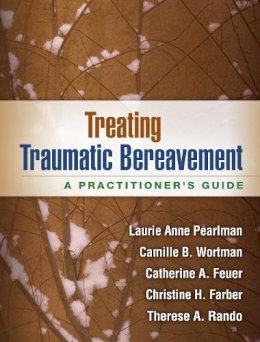
Treating Traumatic Bereavement: A Practitioner´s Guide
Laurie Anne Pearlman
This book presents an integrated treatment approach for those struggling to adapt after the sudden, traumatic death of a loved one. The authors weave together evidence-based clinical strategies grounded in cutting-edge knowledge about both trauma and grief. The book offers a clear framework and many practical tools for building survivors' psychological and interpersonal resources, processing their trauma, and facilitating mourning. In a large-size format for easy photocopying, the book includes over 30 reproducible handouts. Purchasers can access a companion website to download and print these materials as well as supplemental handouts and a sample 25-session treatment plan.
Winner (Second Place)--American Journal of Nursing Book of the Year Award, Psychiatric and Mental Health Nursing Category
Product Details
About Laurie Anne Pearlman
Reviews for Treating Traumatic Bereavement: A Practitioner´s Guide
we will all find ourselves at some time or another confronting the needs and complicated care of those dealing with massive trauma and loss. This book fills a void in the literature."
Terence M. Keane, PhD, National Center for PTSD, VA Boston Healthcare System, and Department of Psychiatry, Boston University School of Medicine "Once every decade a clinical handbook is published that singlehandedly promises to revolutionize the field of grief therapy. With its laser-like focus on the pervasive problem of sudden, violent, and inherently tragic death, Treating Traumatic Bereavement is that book for the current decade. Written with compelling consistency by a 'dream team' of consummate clinical scholars, this volume offers a masterful integration of cogent research, leavened by carefully cultivated psychotherapeutic acumen. The resulting manual is riveting reading and is quite simply the best resource available to those of us who work alongside mourners to reconstruct a world transformed by trauma and loss."
Robert A. Neimeyer, PhD, editor of Death Studies and Techniques of Grief Therapy "Kudos to the authors for bringing their intellectual gravitas and extensive clinical experience to bear on a much-neglected area. The sudden, unexpected death of a loved one is the most common traumatic event and is often identified by survivors as their worst life event. This book provides an accessible roadmap for clinicians working with traumatically bereaved clients on their journey to find a life worth living in the aftermath of devastating loss. With its rich case examples and easy-to-use handouts, this is an invaluable resource for experienced clinicians and clinicians-in-training."
Karestan C. Koenen, PhD, Department of Epidemiology, Harvard T. H. Chan School of Public Health; Department of Psychiatry, Massachusetts General Hospital "I've been waiting a long time for a comprehensive book on this topic Treating Traumatic Bereavement makes it worth the wait. The authors clearly explain the traumatic nature of sudden loss and the additional burden it places on the bereaved. The book beautifully integrates the authors' individual areas of expertise to advance and enrich the fields of traumatic stress and bereavement studies. The treatment model is both theoretically and empirically based, and the handouts provided in the book and at the companion website will greatly assist clinicians in faithfully applying the model. A major contribution!"
Christine A. Courtois, PhD, ABPP, private practice (retired), Washington, DC; consultant and trainer, trauma psychology and treatment, Bethany Beach, Delaware "This book needs to be in the library of every therapist who takes on the difficult challenges of working with the traumatically bereaved. Rich with clinical wisdom and evidence-based practices, Treating Traumatic Bereavement provides a coherent and systematic treatment approach. It is theoretically sophisticated yet eminently and immediately useful to practicing clinicians. You will find yourself using this practical, compassionate book again and again in your professional journey with those who are grieving the most distressing of human losses."
John R. Jordan, PhD, private practice, Pawtucket, Rhode Island, and Wellesley, Massachusetts -Purchasing the book allows the practitioner access to a companion website containing the session planner and over 30 handouts, several of which I have used in my practice. For instance, a recent suicide survivor found the supplemental handout on 'Getting through the Holidays' very helpful. I valued being able to give the client something to take away with her over the difficult Thanksgiving holiday....Each chapter begins with a clinical vignette illustrating the challenges of developing an appropriate treatment approach. These were helpful in setting up the chapter's focus and I think they would be especially valuable to beginning trauma therapists....I highly recommend this book and will add it to my required reading list for graduate students studying traumatic bereavement. I plan to refer to this book and its accompanying handouts regularly in my private practice.
Trauma Psychology, APA Division 56, 6/20/2015
